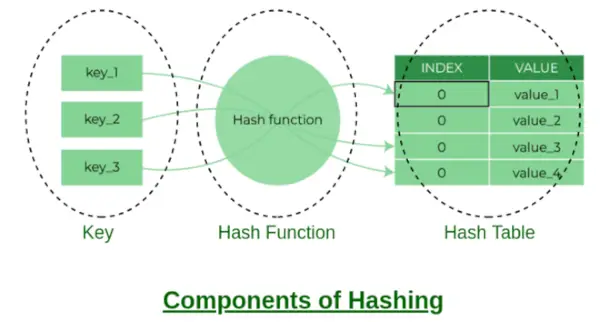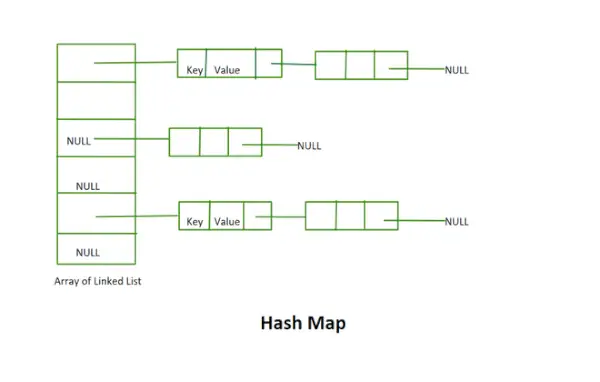Esittely:
URL-osoitteiden lyhentäjät ovat esimerkki tiivistämisestä, koska se yhdistää suuren URL-osoitteen pieneen kokoon
Joitakin esimerkkejä hash-funktioista:
- avain % kauhojen lukumäärä
- Merkin * PrimeNumber ASCII-arvox. Missä x = 1, 2, 3….n
- Voit tehdä oman hash-funktion, mutta sen pitäisi olla hyvä hash-funktio, joka antaa vähemmän törmäyksiä.

Hashingin osat
abstrakti luokka vs käyttöliittymä
Ryhmän indeksi:
Hash-funktion palauttama arvo on erillisessä ketjutusmenetelmässä avaimen ämpäriindeksi. Jokaista taulukon indeksiä kutsutaan säilöksi, koska se on linkitetyn luettelon segmentti.
Uudelleentarkistus:
Uudelleenhajotus on konsepti, joka vähentää törmäystä, kun elementtejä lisätään nykyisessä hash-taulukossa. Se tekee uuden kaksinkertaisen kokoisen taulukon ja kopioi siihen aiemmat taulukon elementit ja se on kuin vektorin sisäinen työskentely C++:ssa. Hash-funktion tulisi luonnollisesti olla dynaaminen, koska sen pitäisi heijastaa joitain muutoksia, kun kapasiteettia lisätään. Hajautusfunktio sisältää siinä olevan hash-taulukon kapasiteetin, joten kun avainarvoja kopioidaan edellisestä taulukon hash-funktiosta, saadaan erilaisia kauhaindeksejä, koska se riippuu hash-taulukon kapasiteetista (ämpärit). Yleensä kun kuormituskertoimen arvo on suurempi kuin 0,5, uudelleentarkistus tehdään.
- Tuplaa taulukon koko.
- Kopioi edellisen taulukon elementit uuteen taulukkoon. Käytämme hash-funktiota kopioitaessamme jokaisen solmun uuteen taulukkoon uudelleen, joten se vähentää törmäyksiä.
- Poista edellinen matriisi muistista ja osoita hash-kartan sisäinen taulukko osoitin tähän uuteen taulukkoon.
- Yleensä kuormituskerroin = Hash Map -elementtien lukumäärä / ryhmien kokonaismäärä (kapasiteetti).
Törmäys:
Törmäys on tilanne, jossa kauhaindeksi ei ole tyhjä. Se tarkoittaa, että linkitetyn luettelon pää on läsnä kyseisessä ryhmähakemistossa. Meillä on vähintään kaksi arvoa, jotka liittyvät samaan ryhmäindeksiin.
Ohjelmamme tärkeimmät toiminnot
- Lisäys
- Hae
- Hash-toiminto
- Poistaa
- Rehashing

Hash kartta
Käyttöönotto ilman uudelleenkäsittelyä:
C
#include> #include> #include> // Linked List node> struct> node {> >// key is string> >char>* key;> >// value is also string> >char>* value;> >struct> node* next;> };> // like constructor> void> setNode(>struct> node* node,>char>* key,>char>* value)> {> >node->avain = avain;> >node->arvo = arvo;> >node->seuraava = NULL;> >return>;> };> struct> hashMap {> >// Current number of elements in hashMap> >// and capacity of hashMap> >int> numOfElements, capacity;> >// hold base address array of linked list> >struct> node** arr;> };> // like constructor> void> initializeHashMap(>struct> hashMap* mp)> {> >// Default capacity in this case> >mp->kapasiteetti = 100;> >mp->numOfElements = 0;> >// array of size = 1> >mp->arr = (>struct> node**)>malloc>(>sizeof>(>struct> node*)> >* mp->kapasiteetti);> >return>;> }> int> hashFunction(>struct> hashMap* mp,>char>* key)> {> >int> bucketIndex;> >int> sum = 0, factor = 31;> >for> (>int> i = 0; i <>strlen>(key); i++) {> >// sum = sum + (ascii value of> >// char * (primeNumber ^ x))...> >// where x = 1, 2, 3....n> >sum = ((sum % mp->kapasiteetti)> >+ (((>int>)key[i]) * factor) % mp->kapasiteetti)> >% mp->kapasiteetti;> >// factor = factor * prime> >// number....(prime> >// number) ^ x> >factor = ((factor % __INT16_MAX__)> >* (31 % __INT16_MAX__))> >% __INT16_MAX__;> >}> >bucketIndex = sum;> >return> bucketIndex;> }> void> insert(>struct> hashMap* mp,>char>* key,>char>* value)> {> >// Getting bucket index for the given> >// key - value pair> >int> bucketIndex = hashFunction(mp, key);> >struct> node* newNode = (>struct> node*)>malloc>(> >// Creating a new node> >sizeof>(>struct> node));> >// Setting value of node> >setNode(newNode, key, value);> >// Bucket index is empty....no collision> >if> (mp->arr[bucketIndex] == NULL) {> >mp->arr[bucketIndex] = uusiSolmu;> >}> >// Collision> >else> {> >// Adding newNode at the head of> >// linked list which is present> >// at bucket index....insertion at> >// head in linked list> >newNode->seuraava = mp->arr[bucketIndex];> >mp->arr[bucketIndex] = uusiSolmu;> >}> >return>;> }> void> delete> (>struct> hashMap* mp,>char>* key)> {> >// Getting bucket index for the> >// given key> >int> bucketIndex = hashFunction(mp, key);> >struct> node* prevNode = NULL;> >// Points to the head of> >// linked list present at> >// bucket index> >struct> node* currNode = mp->arr[bucketIndex];> >while> (currNode != NULL) {> >// Key is matched at delete this> >// node from linked list> >if> (>strcmp>(key, currNode->avain) == 0) {> >// Head node> >// deletion> >if> (currNode == mp->arr[bucketIndex]) {> >mp->arr[bucketIndex] = currNode->next;> >}> >// Last node or middle node> >else> {> >prevNode->next = currNode->next;> >}> >free>(currNode);> >break>;> >}> >prevNode = currNode;> >currNode = currNode->seuraava;> >}> >return>;> }> char>* search(>struct> hashMap* mp,>char>* key)> {> >// Getting the bucket index> >// for the given key> >int> bucketIndex = hashFunction(mp, key);> >// Head of the linked list> >// present at bucket index> >struct> node* bucketHead = mp->arr[bucketIndex];> >while> (bucketHead != NULL) {> >// Key is found in the hashMap> >if> (bucketHead->avain == avain) {> >return> bucketHead->arvo;> >}> >bucketHead = bucketHead->seuraava;> >}> >// If no key found in the hashMap> >// equal to the given key> >char>* errorMssg = (>char>*)>malloc>(>sizeof>(>char>) * 25);> >errorMssg =>'Oops! No data found.
'>;> >return> errorMssg;> }> // Drivers code> int> main()> {> >// Initialize the value of mp> >struct> hashMap* mp> >= (>struct> hashMap*)>malloc>(>sizeof>(>struct> hashMap));> >initializeHashMap(mp);> >insert(mp,>'Yogaholic'>,>'Anjali'>);> >insert(mp,>'pluto14'>,>'Vartika'>);> >insert(mp,>'elite_Programmer'>,>'Manish'>);> >insert(mp,>'GFG'>,>'techcodeview.com'>);> >insert(mp,>'decentBoy'>,>'Mayank'>);> >printf>(>'%s
'>, search(mp,>'elite_Programmer'>));> >printf>(>'%s
'>, search(mp,>'Yogaholic'>));> >printf>(>'%s
'>, search(mp,>'pluto14'>));> >printf>(>'%s
'>, search(mp,>'decentBoy'>));> >printf>(>'%s
'>, search(mp,>'GFG'>));> >// Key is not inserted> >printf>(>'%s
'>, search(mp,>'randomKey'>));> >printf>(>'
After deletion :
'>);> >// Deletion of key> >delete> (mp,>'decentBoy'>);> >printf>(>'%s
'>, search(mp,>'decentBoy'>));> >return> 0;> }> |
>
>
C++
#include> #include> // Linked List node> struct> node {> >// key is string> >char>* key;> >// value is also string> >char>* value;> >struct> node* next;> };> // like constructor> void> setNode(>struct> node* node,>char>* key,>char>* value) {> >node->avain = avain;> >node->arvo = arvo;> >node->seuraava = NULL;> >return>;> }> struct> hashMap {> >// Current number of elements in hashMap> >// and capacity of hashMap> >int> numOfElements, capacity;> >// hold base address array of linked list> >struct> node** arr;> };> // like constructor> void> initializeHashMap(>struct> hashMap* mp) {> >// Default capacity in this case> >mp->kapasiteetti = 100;> >mp->numOfElements = 0;> >// array of size = 1> >mp->arr = (>struct> node**)>malloc>(>sizeof>(>struct> node*) * mp->kapasiteetti);> >return>;> }> int> hashFunction(>struct> hashMap* mp,>char>* key) {> >int> bucketIndex;> >int> sum = 0, factor = 31;> >for> (>int> i = 0; i <>strlen>(key); i++) {> >// sum = sum + (ascii value of> >// char * (primeNumber ^ x))...> >// where x = 1, 2, 3....n> >sum = ((sum % mp->kapasiteetti) + (((>int>)key[i]) * factor) % mp->kapasiteetti) % mp->kapasiteetti;> >// factor = factor * prime> >// number....(prime> >// number) ^ x> >factor = ((factor % __INT16_MAX__) * (31 % __INT16_MAX__)) % __INT16_MAX__;> >}> >bucketIndex = sum;> >return> bucketIndex;> }> void> insert(>struct> hashMap* mp,>char>* key,>char>* value) {> >// Getting bucket index for the given> >// key - value pair> >int> bucketIndex = hashFunction(mp, key);> >struct> node* newNode = (>struct> node*)>malloc>(> >// Creating a new node> >sizeof>(>struct> node));> >// Setting value of node> >setNode(newNode, key, value);> >// Bucket index is empty....no collision> >if> (mp->arr[bucketIndex] == NULL) {> >mp->arr[bucketIndex] = uusiSolmu;> >}> >// Collision> >else> {> >// Adding newNode at the head of> >// linked list which is present> >// at bucket index....insertion at> >// head in linked list> >newNode->seuraava = mp->arr[bucketIndex];> >mp->arr[bucketIndex] = uusiSolmu;> >}> >return>;> }> void> deleteKey(>struct> hashMap* mp,>char>* key) {> >// Getting bucket index for the> >// given key> >int> bucketIndex = hashFunction(mp, key);> >struct> node* prevNode = NULL;> >// Points to the head of> >// linked list present at> >// bucket index> >struct> node* currNode = mp->arr[bucketIndex];> >while> (currNode != NULL) {> >// Key is matched at delete this> >// node from linked list> >if> (>strcmp>(key, currNode->avain) == 0) {> >// Head node> >// deletion> >if> (currNode == mp->arr[bucketIndex]) {> >mp->arr[bucketIndex] = currNode->next;> >}> >// Last node or middle node> >else> {> >prevNode->next = currNode->next;> }> free>(currNode);> break>;> }> prevNode = currNode;> >currNode = currNode->seuraava;> >}> return>;> }> char>* search(>struct> hashMap* mp,>char>* key) {> // Getting the bucket index for the given key> int> bucketIndex = hashFunction(mp, key);> // Head of the linked list present at bucket index> struct> node* bucketHead = mp->arr[bucketIndex];> while> (bucketHead != NULL) {> > >// Key is found in the hashMap> >if> (>strcmp>(bucketHead->avain, avain) == 0) {> >return> bucketHead->arvo;> >}> > >bucketHead = bucketHead->seuraava;> }> // If no key found in the hashMap equal to the given key> char>* errorMssg = (>char>*)>malloc>(>sizeof>(>char>) * 25);> strcpy>(errorMssg,>'Oops! No data found.
'>);> return> errorMssg;> }> // Drivers code> int> main()> {> // Initialize the value of mp> struct> hashMap* mp = (>struct> hashMap*)>malloc>(>sizeof>(>struct> hashMap));> initializeHashMap(mp);> insert(mp,>'Yogaholic'>,>'Anjali'>);> insert(mp,>'pluto14'>,>'Vartika'>);> insert(mp,>'elite_Programmer'>,>'Manish'>);> insert(mp,>'GFG'>,>'techcodeview.com'>);> insert(mp,>'decentBoy'>,>'Mayank'>);> printf>(>'%s
'>, search(mp,>'elite_Programmer'>));> printf>(>'%s
'>, search(mp,>'Yogaholic'>));> printf>(>'%s
'>, search(mp,>'pluto14'>));> printf>(>'%s
'>, search(mp,>'decentBoy'>));> printf>(>'%s
'>, search(mp,>'GFG'>));> // Key is not inserted> printf>(>'%s
'>, search(mp,>'randomKey'>));> printf>(>'
After deletion :
'>);> // Deletion of key> deleteKey(mp,>'decentBoy'>);> // Searching the deleted key> printf>(>'%s
'>, search(mp,>'decentBoy'>));> return> 0;> }> |
>
java xor
>Lähtö
Manish Anjali Vartika Mayank techcodeview.com Oops! No data found. After deletion : Oops! No data found.>
Selitys:
- lisäys: Lisää avain-arvo-parin linkitetyn luettelon alkuun, joka on annetussa ryhmäindeksissä. hashFunction: Antaa ämpäriindeksin annetulle avaimelle. Meidän hash-funktio = merkin * alkuluku ASCII-arvox . Alkuluku meidän tapauksessamme on 31 ja x:n arvo kasvaa 1:stä n:ään avaimen peräkkäisille merkeille. poisto: Poistaa avainarvo-parin annetun avaimen hash-taulukosta. Se poistaa linkitetystä luettelosta solmun, joka sisältää avain-arvo-parin. Haku: Etsi annetun avaimen arvo.
- Tämä toteutus ei käytä uudelleentarkistuskonseptia. Se on kiinteän kokoinen joukko linkitettyjä luetteloita.
- Avain ja arvo ovat molemmat merkkijonoja annetussa esimerkissä.
Ajan ja tilan monimutkaisuus:
Hajautustaulukon lisäys- ja poistotoimintojen aikamonimutkaisuus on keskimäärin O(1). Jokin matemaattinen laskelma todistaa sen.
- Lisäyksen aika monimutkaisuus: Keskimääräisessä tapauksessa se on vakio. Pahimmassa tapauksessa se on lineaarinen. Haun aika monimutkaisuus: Keskimääräisessä tapauksessa se on vakio. Pahimmassa tapauksessa se on lineaarinen. Poistamisen aika monimutkaisuus: Keskimääräisissä tapauksissa se on vakio. Pahimmassa tapauksessa se on lineaarinen. Avaruuden monimutkaisuus: O(n), koska siinä on n lukumäärää elementtejä.
Aiheeseen liittyvät artikkelit:
- Erillinen ketjutuksen törmäyskäsittelytekniikka hajautustekniikassa.
